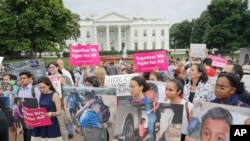In 1985, four Salvadoran girls ages 13 to 16, who had been detained for crossing into the country illegally, were the lead plaintiffs in a class-action lawsuit against the U.S. government. Their case would change how would-be immigrant families are reunited and the conditions unaccompanied minors are held in while in federal custody.
Like the current issue at the southern U.S. border, the court case followed a shift in practice by immigration officials.
Before then, minors could be released on bail to a parent or "responsible adult" pending their immigration hearings. But in 1984, authorities of the Immigration and Naturalization Service — the predecessor of U.S. Immigration and Customs Enforcement and U.S. Customs and Border Protection — began detaining minors indefinitely, "responding to the increased flow of unaccompanied juvenile aliens into California."
Court documents and media reports indicate the facilities used were shacks and tents, "jail-like," and squalid. Children were sleeping alongside adults they didn't know.
The housing situation wasn't the only offense. One of the plaintiffs, a 16-year-old caught by police in Texas, alleged that officials had subjected her to vaginal and rectal searches.
In addition, the plaintiffs alleged the new INS practice of requiring a parent of a child caught crossing the border without papers to personally appear at the detention center before a minor could be released on bond "was a thinly veiled device to apprehend the parents of incarcerated juveniles," the 1985 complaint stated, "and punish children for allegedly having entered the United States without lawful authority."
Accord reached
After more than a decade of court battles, a consent decree was reached in January 1997, during President Bill Clinton's second term. The parties agreed to what would be called the Flores Settlement or the Flores Agreement, in which the government established it would hold unaccompanied minors like Jenny Flores and the other plaintiffs in the "least restrictive" setting possible, and release them as quickly as possible to adults who met certain criteria — not exclusively a parent.
The agreement also outlined the minimum standards at facilities housing children, including separation from unrelated adults, and stated that families could not be detained longer than 20 days.
On June 20, 2018, President Donald Trump referenced the Flores Agreement in an executive order to deal with the fallout of a Cabinet-level decision to criminally prosecute undocumented border-crossers as much as possible, which in turn led federal officials to separate children who had crossed the border with their parents pending the outcome of the immigration and criminal cases.
Then, on June 21, 2018, the Justice Department requested an exemption from the Flores Agreement that would allow for the detention of families together, rather than have adults and children held separately. The government also petitioned the court to exempt the family facilities from state standards.
So what's next?
"The court is not likely to amend the Flores Agreement," David Bier, immigration policy analyst at the Cato Institute, an American libertarian think tank, told VOA. "I don't expect that the Trump administration, with lower immigration figures than they had in 2014-2015, is likely to be able to convince a court that there is a need for them to adjust the standards for holding children. Really, what they're asking for is to remove the standards that we set up to prevent people from being trafficked and to treat children humanely."
A recent lawsuit against a Texas facility, first reported by Reveal News and the Texas Tribune, indicated that how immigrant children were treated while in custody might still be problematic — and abusive.
VOA associate producer Jesusemen Oni contributed to this report from Washington.




